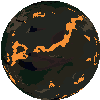Overview
Dremachir (Dreh-mah-kheer) is the blanket-name given to the vast collective of genetic divergent subspecies originating from Auril, mostly located within their chaotic planet-world, Drema, within the Daedal system. Their homeworld is a resource-rich, dark, dusty planet with large uninhabitable wastes and dotted with sulphur-rich lakes that have an eerie, orange glow. Despite nearly three centuries of consistent efforts by the colonisers, the planet remains a hostile environment. Most of the habitable hotspots, where vast aquifiers of water along with other natural resource pockets were discovered, were occupied and turned into expansive, country-sized megalopoli with little to no planetary oversight or governance. Nowadays, the Dremachir world serves as a local sector center of commerce and services, where one can buy, find or hire almost anything they might desire.
The Dremachir themselves are a varied, inconsistent mixture of various nations, groups, gangs and subspecies, the only concretely unifying trait among them being having little desire to be fully integrated into the core Auril society.
History
Preface
Documentation that can be considered in any way official and of Dremachir origin is sparse at best. Each city, village, factory and potentially even household can have a different recounting of any number of events, especially ones predating the Auril attempt at reclaiming Drema. However, this does not mean that Auril and Dremachir scholars alike didn't try. In spite of the planet's weather tending towards massive dust-storms that used to bury entire villages, hostile fauna and even more hostile locals, a somewhat consistent thread in the tumultuous history of the planet and its people was found. The events as described aren't to be taken as gospel.
The Collapse
Despite being the oldest event relative to the Dremachir history, it is not the vaguest. The original self-replicating genetic modification colony facilities that were built before the Vox invasion on the Auril homeworld are still standing. The same facility was also replicated in every major megalopolis on the planet. The logs extracted from the machinery paint a somewhat clearer picture. Facing complete cut off from the core system, the local Drema Aurils seemingly spread out towards the most habitable or otherwise exploitable locations on the planet's surface, and subsurface, and using genetic caches from the original facility, began adapting themselves for the varied environments they faced. Despite the rather obvious conclusion, the mechanics of it remain a mystery, as few means of planetary logistics were available at the time, and fewer for additional construction.
Nevertheless, this marked the seeds of the dwellings, and the distinctly varied genetic nature of the now-forming Dremachir, as every locale required different treatments for optimal survival -- which was likely seen as preferable at the time.
The Aid & Rejection
Decades later an investigative Human fleet was retracing the path of the same Vox flotilla that ravaged the Auril world and discovered the Daedal system. While the primary planet they scouted was Aura, all they received was a declination of any aid whatsoever, despite the planet's visibly ravaged state. Drema, however, sent back several pings of request for aid, each from different locations on the planet. The fleet soon sent out additional beacons and began to coordinate supplying and building up the existing external infrastructure. It is believed they were the main contributors to the technological maintainability and the establishment of some form of rudimentary logistical network between the clusters of life on the surface. At this point, the Dremachir were taking shape in distinguished subspecies, and the underground expanses were being discovered and starting to be exploited.
The logs of the charitable fleet in question gave us a rough estimate of several years of continuous aid, it noting that every major establishment was provided with adequate self-sustaining provisions based on the varying needs per 'city', while also laying the backbone of commerce, as docks and guiding satellites were setup to facilitate the operations. However, with the rising self-sufficiency of each dense pocket came rivalries between them over yet-unclaimed destinations, or simply due to the growing cultural differences. This resulted in several individual groups actively robbing and looting the aiding fleet to the point several ships were abducted to aid in a local war and they decided to pull out. This marked the beginning of the locally nicknamed 'Great Screw Up' -- a tumultuous time of constant warring between the growing distinct factions and cities.
The Humanphage
With the human fleet departed, the entire planet was left to fend for itself once more, resulting in the isolated, growing cities diversifying further, influenced by their hostile neighbors and differing ideals. However, this didn't last longer than a few decades at most, as the news of a "Hell planet" had spread, and aspiring explorers, prospectors and other interested parties from various Orion reaches began to visit. Given the state of almost every faction had decayed, the humans were welcomed back, and trade pacts were beginning to form. The first such Sol traders, either as a happenstance joke, or due to the environment on the planet, decided to name the cities after the Christian deadly sins. The very first city nicknamed like this was also the main trading hub, and was appropriately named 'Greed'. Ever-growing demand of the planet's resources began to speed up the overall development, with service and industry beginning to solidify, all under the purview of Greed's now-made magnates, which helped fund the slow formation of Lust and Sloth, as humans provided the means to industrialize, and a growing appetite for service.
It is around this time that the underground network was established, handled by a modified, imp-like subspecies of the original Drema colonists. Travel over the surface was hardly safe for any shipping platforms, be it from turbulent weather or the ever-present bandits.
